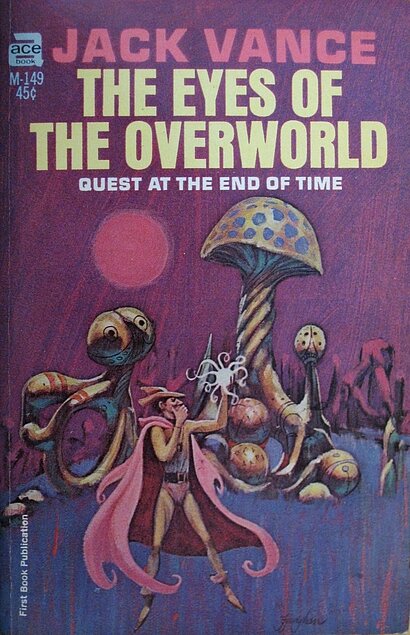The Eyes of the Overworld by Jack Vance Book Review
Cugel the Clever stumbles from one adventure to another in a dismal world, ancient beyond memory, in Jack Vance’s The Eyes of the Overworld [Amazon link]. Written in 1966, Cugel’s world spanning tale of thwarted ambition and stillborn revenge is darkly epic.

The Eyes of the Overworld by Jack Vance (1966)
Reading through my omnibus edition of Tales of the Dying Earth [Amazon link], I find the contrast between the 1950 The Dying Earth and the 1966 The Eyes of the Overworld remarkable. The world is the same, but the style of the story is very different. Unlike the loosely connected short stories of the first book which featured a variety of different characters, this whole volume centers upon Cugel the Clever.
This focus upon Cugel isn’t the only difference. I complained in my review that the characters of The Dying Earth were unfairly maligned as rapacious. For Cugel, on the other hand, that criticism would be apt. Cugel’s vanity and ambition far outstrip his competence, although not perhaps his luck. He is the classic anti-hero, a liar, a cheat, and a thief whose only redeeming quality is that he discomfits those worse than himself.
Since this is only the second book by Vance I’ve read, I don’t know his motive for trying something different. Perhaps the times had changed, or perhaps Vance had. In any case, the feel of the story is quite different. There was something magical [not Vancian] about The Dying Earth that is missing here. However, I did enjoy Cugel’s adventures, and I can see why Gygax listed The Eyes of the Overworld first in Appendix N, as it contains much more of the magical mechanics that eventually found their way into Dungeons and Dragons.
There is a grandness to the sweep of Cugel’s journey, despite his personal lacks. Since many of the chapters of The Eyes of the Overworld were originally published in magazines, each chapter is relatively self-contained. Thus, Vance has to establish each setting quickly, leading to a plethora of interesting locales. My favorite is the ever-watchful village of Vull, in the “Mountains of Magnatz”.
The anti-hero style of the book does have one thing going for it. What Cugel does to Vull is more satisfying than the ending of Le Guin’s thinkpiece, Those Who Walk Away from Omelas. Vance wasn’t trying to make it high art, which is almost always a mistake. The combination of an episodic structure with the fundamental premise, Cugel’s cupidity gets him into trouble and his luck gets him out again, does not allow Vance to get too clever, which is a good thing.
So despite a big change in style, I did like the second entry in The Tales of Dying Earth, and I’m looking forward to Cugel’s Saga next. Jack Vance made the anti-hero thing work, at least this time.
My other book reviews | Reading Log
Other books by Jack Vance
Other Pulp Adventures
Adam Lane Smith Gideon Ira: Knight of the Blood Cross
JD Cowan Someone is Aiming for You
Daniel Humphreys Fade: Paxton Locke
Appendix N
A. Merritt. The Moon Pool
Leigh Brackett. The Coming of the Terrans
C. L. Moore. The Best of C. L. Moore
Robert E. Howard. The Savage Tales of Solomon Kane
Fritz Leiber Ill Met in Lankhmar
H. Beam Piper Space Viking
H. Beam Piper Lord Kalvan of Otherwhen
Robert E. Howard The Savage Tales of Soloman Kane



Comments ()